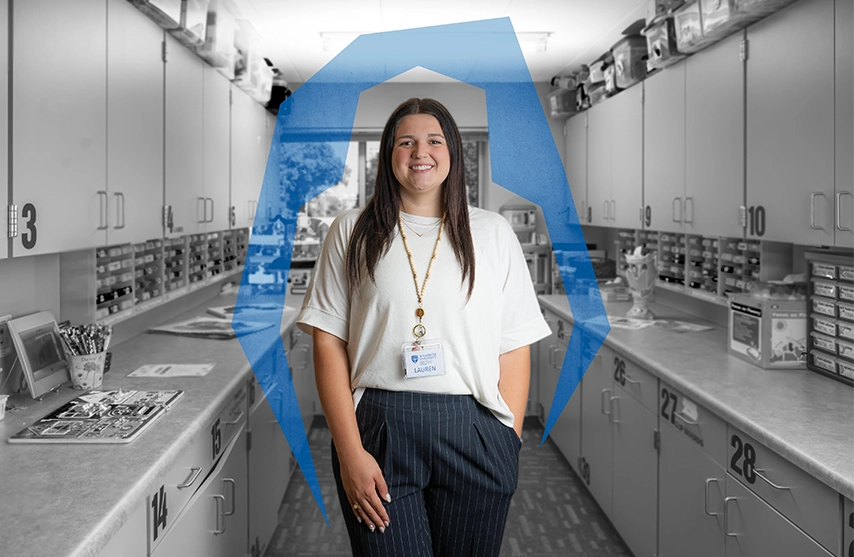Four days a week, Lauren Posten ’24, ’26 MSLP, walks the halls of Truman Elementary School – exactly where everyone said she’d end up. But not quite how they imagined.
“People always said I’d be a good teacher,” Posten said. “And I think that’s true, but it just wasn’t quite where my calling was.”
She felt called to support people, and certainly she could have done that in the classroom. But she also loves science, and the care her grandmother received during a serious illness left a lasting impression.
“She was the grandma that lived the life of a 20-year-old,” Posten recalled. “She went to hot yoga, she biked all over town, and she had a different lunch meeting every day. Then she was diagnosed with pancreatic cancer and all of that was taken away from her within the first few months, weeks, maybe.”
During that time, Posten’s grandmother needed support from family and health care professionals. Posten saw her work with numerous therapists and felt the impact of their care on both her grandmother and her family.
“Seeing how much the medical professionals impacted her life – and also my family’s – showed me that that's where I needed to be. I hope that nobody goes through the hardest moment in their life without a support system and I hope I can be that support system for other people.”
Her passion was clear, but her career path was wide open. Smart and driven, Posten threw herself wholeheartedly into her St. Ambrose degrees. She discovered a flexible, supportive, and personalized education that turned passion into purpose and helped her discover who she is meant to be.
The Journey to MSLP
Posten’s path to the MSLP program began as an undergraduate. She transferred to St. Ambrose during the second semester of her first year in college. She transferred during the height of COVID-19, when her first school faced program changes and funding cuts. She had three weeks to make the switch. She says St. Ambrose was the clear choice.
“They actually gave me my high school scholarship package instead of considering me a transfer because of everything that had happened with COVID,” Posten said. “My counselor was so helpful and willing to get me where I needed to be, even if it took a little bit of extra work.”
Posten was able to get into all the classes she needed to ensure she’d remain on track to finish her degree in four years, and her counselor made it easy for her to understand which credits would transfer.
That willingness to help was a through line for Posten’s St. Ambrose education. Though she knew she wanted to provide support to people, she wasn’t quite sure exactly how she wanted to achieve that.
Posten ultimately graduated with a degree in behavioral neuropsychology and a minor in biology. She says the flexibility of her St. Ambrose education helped her explore different pathways during a time when job shadowing was limited.
“I was pre-med, and then I finally was able to observe and realized that I wasn't a huge fan of the acute care setting,” she explained. “I also was interested in more of a work-life balance, and I felt like I wasn’t going to get that in the pre-med direction. I was pretty lost.”
Access to explore health care programs
Luckily, Posten didn’t have to go far to explore the vast career opportunities in health care. St. Ambrose University offers doctoral degrees in physical therapy and occupational therapy, and master’s degrees in physician assistant studies and speech-language pathology.
“I knew the therapy setting would be kind of ideal. I really wanted to work with people and be present enough in people’s lives that I would see the progress that they were making. That’s what I was lacking in the medical setting.”
Still searching for the perfect fit, Posten easily connected with the directors of the OT, PA, and MSLP programs to evaluate which career was right for her.
“I got to speak with their directors, and even if I wasn't going to stay at Ambrose for grad school, being able to see those programs and talk to the person who ran them all on my own campus was super helpful.”
Choosing MSLP at SAU
Part of Posten’s evaluations of the programs included her ability to complete undergrad in four years. It was clear from her first meeting with Elisa Huff, PhD, MSLP program director, that she could achieve this.
“One of her biggest assets is just how inviting and welcoming she is,” Posten said of Huff. “I came in as a junior and thought, ‘I haven't done anything for prerequisites for speech, and I want to come here in a year and a half, and so what do I do?’ And she just acted like that was not a problem at all.”
Posten says she was able to take on extra credit hours to complete the necessary prerequisite courses, and Huff taught one course to her as an independent study. The program’s willingness to go the extra mile solidified her interest in the profession.
Posten wanted to get the best education she could. That meant keeping her options open for graduate school. She was accepted into Northwestern’s and Iowa’s MSLP programs, but ultimately, St. Ambrose offered something these larger schools couldn’t.
“I was looking for something challenging,” Posten said. “I visited the other schools, and St. Ambrose just has an inviting, welcoming face that those programs didn't have. I knew my education at St. Ambrose would be personalized to me and that they really cared about my success.
“I wanted to be challenged in the ways that would benefit me as a clinician, because speech paths can work in so many different settings, and so challenging me in something that I wasn't interested in going into wasn't what I was looking for.”
A personalized education
The biggest advantage of the St. Ambrose MSLP program is the clinical work. Though the coursework is the same for all students, the clinic work can be individualized to each person’s interests.
At SAU, students begin providing no-cost services to children and adults in the Quad Cities through the RiteCare Clinic – a teaching clinic operated by the MSLP program – within weeks of starting their first semester. Student clinicians are integrated into each client’s treatment under the supervision of a licensed SLP. It’s the only no-cost clinic in the state for people with communication and swallowing disorders.
Posten is reaping the benefits of this early hands-on learning during her first semester-long clinical placement.
While working at the RiteCare Clinic, Posten was assigned to a youth client. The child had behavioral needs and was working on self-regulation. She says it was a challenging case that required significant help from the supervising clinician.
“That is something that I think is unique about me versus some other students from other programs,” she said. “I'm next to people who may not have even seen any of those behaviors, let alone then providing therapy to a client who exhibits them. The amount of supervisor support that Ambrose is willing to provide to one specific client is huge. If they hadn’t done that, I wouldn't have had such a good experience going into my placement.
“Now I'm in the schools, and we have some kids that have very similar behaviors, and my supervisor has said, 'You're one of the only interns who has seen some of those behaviors and isn't weary of the children because of their behavior.’ That’s because I already had almost two semesters of experience with a client that had similar needs.”
Her placement at Truman Elementary is yet another example of the program’s efforts to ensure it meets students’ needs. Posten submitted three clinical placements and was assigned her top choice for both semesters.
“I felt like Elisa Green, our fieldwork coordinator, was invested in finding me the placement that I wanted or that I thought would benefit me most. I know that in other programs, that's not always happening because there's just too many students to place, or they honestly don't know the students well enough to know what will benefit them the most.”
After completing her internship at the elementary school, Posten will move on to MercyOne Genesis West to gain experience in inpatient rehab. According to Posten, it’s a niche area, and a placement she’s confident was made possible because of the close-knit nature of the St. Ambrose program.
If you’re looking for a place that’s going to invest in you, work with you one-on-one, and ensure you’ll achieve all you set out to do, Posten says St. Ambrose is the place for you.
“The MSLP program is going to know your name and your sister's name and what you're most interested in and what your undergrad was, the professors know that, the clinical supervisors know that, and I just don't believe that that would be the case in a lot of other places.
“They know exactly who I am, where I came from, and where I wanted to go.”
A bright future
Today, Posten is exactly where others told her she’d be her entire life – working in a school alongside children. But she’s doing it her way – as a student intern and future SLP. Long-term, she doesn’t picture herself in a school. Instead, she plans to work as a clinician supporting complex medical cases, with the ultimate goal of becoming a health care administrator.
“I knew that from the beginning,” she said of her career goals. “I would love to be in administration, whether that means opening my own outpatient clinic or being in administration in some sort of hospital setting. Either way, I think coming in on the clinical floor is super beneficial. I don't ever want to be making changes in the lives of people whose path I haven’t walked.”
No matter where life takes Posten, she is steadfast in her belief that her St. Ambrose education is providing the foundation for her to become who she’s meant to be.
“One of the big things my grandma said was ‘Stand in your truth,’ and I have it tattooed on my arm. I think that the St. Ambrose MSLP program let me stand in my truth even when it was different from someone else's. And that is huge for the program. They let you be the clinician that you are going to be rather than trying to make you a copy of anybody else.”



